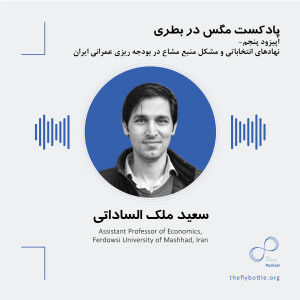
Monday Nov 27, 2023
قسمت ۱۱ - «نهادهای انتخاباتی و مشکل منبع مشاع در ایران» در گفتوگو با سعید ملک الساداتی
در این قسمت از پادکست فلای باتل، علیرضا محمودی با سعید ملک ساداتی استادیار اقتصاد دانشگاه فردوسی مشهد گفتگو میکند. در این گفتگو، پس از معرفی مهمان برنامه و مروری بر تحصیلات آکادمیک سعید، وی منبع مشاع یا اشتراکی را تعریف کرده و نقش نمایندگان پارلمان در برداشت و یا تخصیص این منابع را صورتبندی میکند. وی در ادامه، این موضوع را مطرح میکند که قوانین فعلی انتخاباتی ایران چرا و به چه صورت به مشکل منبع مشاع دامن میزند. در این راستا وی نقش سیاستهای بودجهای فعلی ایران، تصویب شده توسط نمایندگان مجلس ایران که با قوانین فعلی انتخاباتی، انتخاب شدهاند را حائز اهمیت میداند. سپس سعید با تعریف فدرالیسم بودجهای و تعریف کردن مدل انتخاباتی که هسته اصلی پایاننامه دکترای وی را تشکیل میدهد چگونگی کاهش مشکل منبع مشاع را تشریح میکند. مدل مطرح شده توسط سعید به طور کلی پیشبینی میکند که در صورت اعمال فدرالیسم اقتصادی با تغییر قانون انتخاباتی فعلی و افزوده شدن مجلس دیگری برای طرحهای کلان ملی, منبع مشاع کاهش و در عین حال پاسخگویی افزایش پیدا میکند. این امر البته از نظرگاه سیاسی نیازمند مطالعه جداگانهای است.
سعید ملک الساداتی استاد اقتصاد دانشگاه فردوسی مشهد است. وی دکترای خود را در رشته اقتصاد در سال 1392 خورشیدی با کار بر روی نهادهای انتخاباتی و مشکل منبع مشاع در بودجه عمرانی ایران دریافت کرد. وی دانشآموخته کارشناسی از دانشگاه فردوسی و همچنین فارغالتحصیل کارشناسی ارشد از دانشگاه علامه طباطبایی، هر دو در رشته اقتصاد است.
علیرضا محمودی دانشجوی علوم رفتاری در مدرسه کسبوکار آدام اسمیت دانشگاه گلاسگو اسکاتلند است. وی همچنین دانشآموخته کارشناسی اقتصاد دانشگاه فردوسی مشهد است.
صدا: نیوشا ایمانی
موسیقی: رضا ندری
پوستر: پویا فتورهچی
نویسنده: امیرعلی شمس
تهیهکننده: یگانه خزاعی در پادکست فلای باتل
In this episode of the Fly Battle podcast, Alireza Mahmoudi talks with Saeed Malek-Sadati, assistant professor of economics at Ferdowsi University of Mashhad. In this conversation, after introducing the guest and reviewing Saeed's academic background, they discuss and define common or shared resources and formulate the role of the parliament representatives in resource allocation. Furthermore, Saeed raises the issue of how current electoral laws in Iran affect the problem of shared resources and explains why and how they pose challenges. In this context, he emphasizes the importance of Iran's current budgetary policies, approved by the parliamentarians who were elected under the existing electoral laws. Saeed then discusses the concept of budgetary federalism and outlines the electoral model that forms the core of his doctoral thesis, explaining how it can alleviate the issue of shared resources.
Saeed's proposed model generally predicts that the application of economic federalism, along with changes in the current electoral laws and the addition of another parliament for national macroeconomic policies, can reduce the problem of shared resources while increasing accountability. However, this matter requires further political consideration.
Saeed Malek Sadati is an economics professor at Ferdowsi University of Mashhad. He obtained his doctoral degree in economics in 2013, focusing on electoral institutions and the issue of shared resources in Iran's development budget.
Alireza Mahmoudi is a post-graduate student of behavioral science at the Adam Smith Business School, University of Glasgow, Scotland. He is also a graduate in economics from Ferdowsi University of Mashhad.
Suggested Reading:
- Child Labor and Unemployment: a Tale of Two Associations in Urban and Rural Areas in Iran (link)
- Borda Paradox in the 2017 Iranian presidential election: empirical evidence from opinion polls (link)
- Assessment of Virtual Water Flows in Iran Using a Multi-Regional Input-Output Analysis (link)
Sound: Behdad Chalaki and Niusha Imani
Music: Reza Nadri
Cover art: Pouya Fatoureh-chi
Content Editor: َAmirali Shams
Produced by Yeganeh Khazaei in the Flybottle Podcast
No comments yet. Be the first to say something!